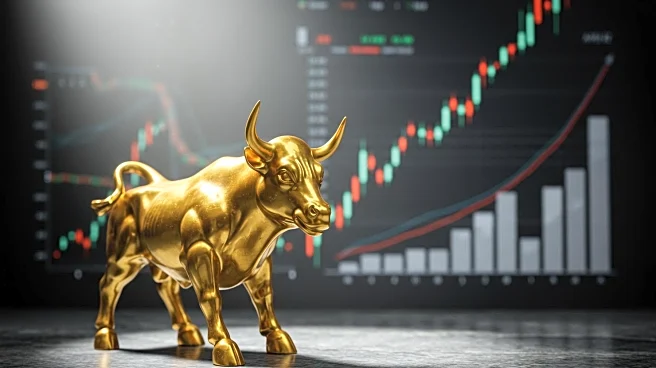What's Happening?
The U.S. stock market experienced a significant rally, reaching record highs as investors reacted to better-than-expected inflation data. The Standard & Poor’s 500 index rose by 1.1%, surpassing its previous all-time high, while the Dow Jones Industrial Average increased by 483 points, and the Nasdaq composite climbed 1.4%. This surge is attributed to optimism that the Federal Reserve might lower interest rates in its upcoming September meeting. The inflation report indicated that consumer prices rose by 2.7% in July, slightly below the anticipated 2.8%, which has fueled speculation about potential rate cuts. President Trump has been vocal in advocating for rate reductions to stimulate the economy, despite the Federal Reserve's cautious stance due to concerns over inflation exacerbated by tariffs.
Why It's Important?
The potential for interest rate cuts by the Federal Reserve is significant for the U.S. economy as it could lower borrowing costs for households and businesses, thereby stimulating economic activity. Lower rates can lead to increased investments in housing, automobiles, and business equipment. However, the decision is complex, as reducing rates could also fuel inflation, particularly in the context of ongoing tariff impacts. The stock market's response reflects investor confidence in economic growth prospects, but it also highlights the pressure on the Federal Reserve to balance inflation control with economic stimulation. The outcome of these decisions will have broad implications for economic stakeholders, including businesses, consumers, and financial markets.
What's Next?
The Federal Reserve is expected to make a decision on interest rates at its meeting concluding on September 17. Before this, it will receive additional data on inflation and the job market, which will influence its decision-making process. Investors and economists will closely monitor these reports, as any unexpected changes could alter the current market dynamics. The Fed's dual mandate of maintaining stable inflation and a healthy job market presents a challenging balancing act, and its upcoming decisions will be pivotal in shaping the economic landscape.









